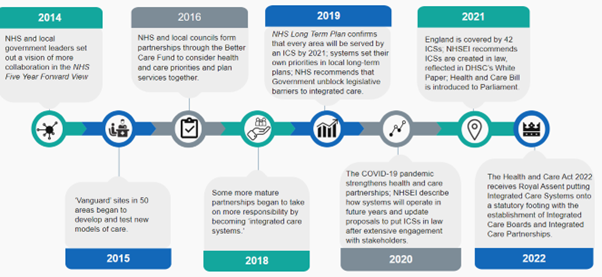The journey to integrated care systems
Developing more joined-up health and care has been a bottom-up, step-by-step journey for the NHS and its partners, building on the expertise of frontline staff and learning from what works well in different areas.
In 2014, the NHS set out a widely supported vision for the future, describing the need for “triple integration” between hospitals and GPs, the NHS and social care, physical and mental health, and kicked off vanguard projects around the country.
In 2016, NHS England asked all parts of England to begin planning a new partnership formed of all NHS organisations, local government and others, setting out their early thinking and working with partners to develop them.
In 2018, it named the most advanced parts of the country as the first integrated care systems, with NHS England working closely with them to pioneer best practice.
In 2019, the NHS Long Term Plan set the ambition for all parts of the country to become integrated care systems by April 2021 – “the biggest national move to integrated care of any major western country”.
In 2019, NHS England recommended that government unblock legislative barriers to integrated care following a major engagement exercise to identify consensus across the health and care system.
In 2020, the COVID-19 pandemic accelerated integrated working as health and care leaders joined forces to support people at risk, offer each other mutual aid, and deliver the vaccine programme.
In November 2020, the NHS set out the next steps for creating robust integrated care systems in every part of the country and launched an engagement exercise on enhanced proposals for creating statutory integrated care systems.
In January 2021, the NHS confirmed its legislative recommendation to the government – making adjustments to reflect feedback from local government in particular – and the government took this forward in its White Paper in February.
In April 2021, all 42 parts of England were declared integrated care systems.
In July 2021, the government published draft legislation proposing the creation of statutory integrated care systems.
In April 2022, the government passed the Health and Care Act 2022, confirming the creation of statutory integrated care systems.
On 1 July 2022, statutory integrated care systems arrangements were established.
In December 2022, Integrated care partnerships developed their interim integrated care strategies.
In June 2023, Integrated care systems published their five-year joint forward plans.

